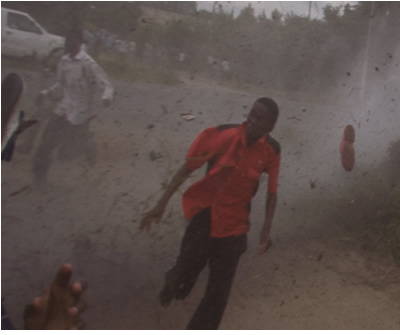I live in a country that legislates morality; a country where the oppression of certain quarters of the society is institutionalized and where the law is used to police the personal choices of its citizenry, used as justification to intrusively enforce morality in the private lives of people.
I live in a country that daily wakes up to read of the most horrendous acts of inhumanity, shaking their heads as they sip their morning coffee and quickly moving away from the unpalatable story of the man who has raped his 3 month old baby to the cartoon section – thinking ‘what has this world come to?’
I live in a country that condones corruption, daily turning a blind eye to the cash exchanging hands between the commuter omnibus and the strategically placed traffic cop who will shrug off the guilt (if any) by reminding him or herself that survival supersedes any other moral code – he has kids to feed.
I live in a country where men and women make personal choices that impact on the lives of defenseless children, pursuing the thrill of illicit affairs, peeling skins off one another with scalding water, shedding blood with knife stabs and as domestic violence escalates, society looks the other way or offers ineffectual sermons on the need to ‘seek counseling from elders, church, relatives or professionals’.
I live in a country where the bulk of the citizenry have the biblical log stubbornly lodged in their eyes and still claim a right to criticize the ‘speck’ in the eyes of the few who are seen as making ‘unnatural’ choices because (to their way of thinking) they have a right to dictate what grown up adult men choose to do behind closed doors.
Gay people in Zimbabwe (and yes they are there) have been victims of the worst social injustice in recent times – likened to animals, their human dignity has been torn to shreds by the vicious machinery of bigoted public opinion.
I am a sucker for social justice and to me, social justice rests firmly on the belief that every human being has a right to life, a right to hold autonomy over their body and a right to dignity (if you can’t respect their choices at least acknowledge that they have a right to their dignity).
So I ask myself, where is this social outrage, anger and vicious dissention when we need it most? Where are these chiefs (would-be enforcers of morality) when rapists prey on the frail grannies who are under their chieftaincy – where is this vehement and boisterous condemnation of such acts?
Why are these enraged defenders of morality silent where it matters most? Do they challenge the man caught in bed with a married woman, do they vilify the married man who’s having an affair with a school child?
Yet it is almost comical (if one can ignore the superciliousness) to hear how our intolerant society is up in arms against the gay community.
Those who still have breath (after denouncing homosexuality by screaming themselves hoarse) often pose the question, ‘what are we going to do about these gays?’
Well, I was thinking – how about we leave them alone?
I’m certain being homosexual is not a contagion so we can all rest assured that there won’t be an ‘outbreak’ of homosexually oriented people. Among the arguments I have heard made against recognizing the rights of gay people is that what they are doing is ‘immoral, unnatural and contrary to God’s plans’.
It is the latter that leaves me in stitches, because this tendency to brandish the bible like some tool of exorcism meant to subdue gay people into sexual conformity is what defeats the whole purpose of the exercise – the bible above all else teaches love, values tolerance and expressly appoints God alone as the judge.
How selective (not to mention hypocritical) of people to use an article of faith like the bible to impose their own beliefs on others and worse still to go on and enact it into legislation.
I think too many people in our society suffer from the fallacious thinking that gay people actually need our permission, consent or approval to exist, to be what they are and to have the sexual preferences that they have.
They don’t.
Gay people have nothing to apologize for; they don’t owe us heterosexuals any explanation and our refusal to recognize their right to privacy and dignity doesn’t change the fact that they have those rights by virtue of having been born human.
So while we can curtail the expression of the rights and liberties of the gay community by criminalizing their sexual orientation, using legislation to bludgeon them into submission and using other social institutions to victimize, terrorize and degrade them – gay people remain human, not animals.
They are gay, so what?
While the idea may repulse many; I think at the end of the day we have no right (moral or otherwise) to dictate the sexual lives of gay people in as much as they have no right to dictate to us heterosexuals.
I live in a country where there are too many loud prejudiced voices, standing piously on the moral high ground, their sanctimonious gospel of intolerance surpassed only by the blinding glare of their fake halos.
What I resent and challenge is the idea that one person or set of people has a right to impose definitions of reality on others.
To paraphrase, Arthur Schopenhauer’s views, they tell us that (homosexuality) is the greatest state of insanity… that (homosexuality) is wrong; when it is quite obvious that there is nothing in the world to which every man has a more unassailable title than to his own life and person.
I don’t believe in homosexuality. But I also don’t believe that anyone has a right to take what is an article of faith to their selves and legislate it (or impose it on) to other people.










